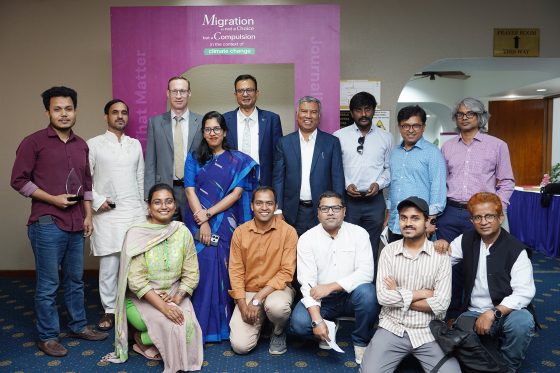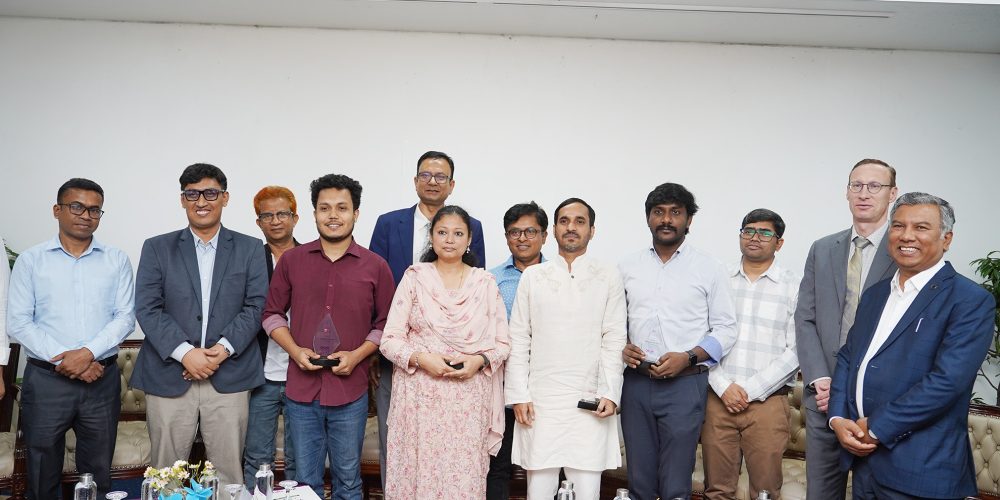The Ovibashi Karmi Unnayan Program (OKUP) proudly launched the OKUP Media Fellowship 2025 on Climate Change, Migration, and Modern Slavery at an event held on March 18, 2025, at Pan Pacific Sonargaon, Dhaka. The fellowship aims to recognize outstanding journalists dedicated to evidence-based storytelling on the critical intersection of climate change, migration, and labor exploitation in Bangladesh.
The fellowship was awarded to four distinguished journalists: Tahsina Sadeque (Television – DBC News), Abdullah Md. Abbas (Print – English,The Daily Star ), Md. Mohiuddin (Print – Bangla, Prothom Alo), and Raihan Ahmed (Online – Jago News). These fellows were selected through a rigorous evaluation process conducted by an independent jury board.

Md Abdul Malek, Associate Professor at the Department of Geography and Environment, presented the evaluation process, highlighting the criteria used to assess the applicants’ investigative skills, depth of research, and commitment to amplifying migrant workers’ voices.
The event featured esteemed guests, including Chief Guest AKM Sohel, Wing Chief at the United Nations and Additional Secretary of the Economic Relations Division, Government of Bangladesh. Special guests included Kazi Amdadul Haque, Senior Director of Strategic Planning and Head of Climate Action at Friendship; Dr. Felix Gerdes, Resident Representative of Friedrich-Ebert-Stiftung (FES), Bangladesh Office; Porimal Palma, Diplomatic Correspondent at The Daily Star; and Mostafizur Rahman, National Programme Officer for Climate and Environment at the Embassy of Sweden in Dhaka.
A key highlight of the event was the presentation of a study conducted by OKUP on the economic struggles and exploitation of climate-affected migrants. The research, which focused on two highly vulnerable districts—Mathbaria in Pirojpur and Gowainghat in Sylhet—revealed that migrants spent an average of Tk 461,220 to work abroad, with 25 percent of the funds sourced from land sales and 18 percent from high-interest loans.
Shakirul Islam, Chairperson of OKUP, elaborated on the increasing salinity in coastal lands, erratic rainfall, and worsening agricultural conditions that are forcing people to migrate. He emphasized that 81 percent of displaced individuals resort to loans to rebuild their homes after climate disasters, but repeated calamities hinder their ability to repay debts. He urged the government to take proactive measures in addressing these challenges.
OKUP’s Executive Director, Omar Faruque Chowdhury, underscored the critical role of media in shaping public discourse on migration and climate change. He stated that sustainable solutions require collective action and that initiatives like the OKUP Media Fellowship help bridge the gap between grassroots experiences and national policymaking.
The research findings highlighted severe exploitation faced by Bangladeshi migrant workers, with 99 percent experiencing at least one form of abuse and 81 percent subjected to five or more types of forced labor, including wage theft, unpaid salaries, and physical or mental abuse. The study also called for policy reforms to ensure safe migration pathways and accountability for labor rights violations.
The event concluded with a call to action for policymakers, international stakeholders, and the media to work together in addressing the nexus of climate change, migration, and modern slavery, ensuring protection and justice for vulnerable communities.


